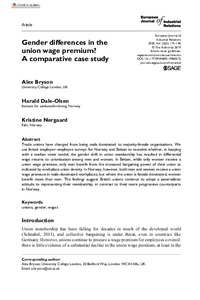Gender differences in the union wage premium? A comparative case study

Bryson, Alex ; Dale-Olsen, Harald ; Nergaard, Kristine
European Journal of Industrial Relations
2020
26
2
June
173-190
trade union ; gender ; wages ; wage policy ; trade unionization ; wage differential
Trade unionism
https://doi.org/10.1177/0959680119840572
English
Bibliogr.
"Trade unions have changed from being male dominated to majority-female organizations. We use linked employer–employee surveys for Norway and Britain to examine whether, in keeping with a median voter model, the gender shift in union membership has resulted in differential wage returns to unionization among men and women. In Britain, while only women receive a union wage premium, only men benefit from the increased bargaining power of their union as indicated by workplace union density. In Norway, however, both men and women receive a union wage premium in male-dominated workplaces; but where the union is female dominated, women benefit more than men. The findings suggest British unions continue to adopt a paternalistic attitude to representing their membership, in contrast to their more progressive counterparts in Norway."
Digital
The ETUI is co-funded by the European Union. Views and opinions expressed are however those of the author(s) only and do not necessarily reflect those of the European Union or the ETUI.